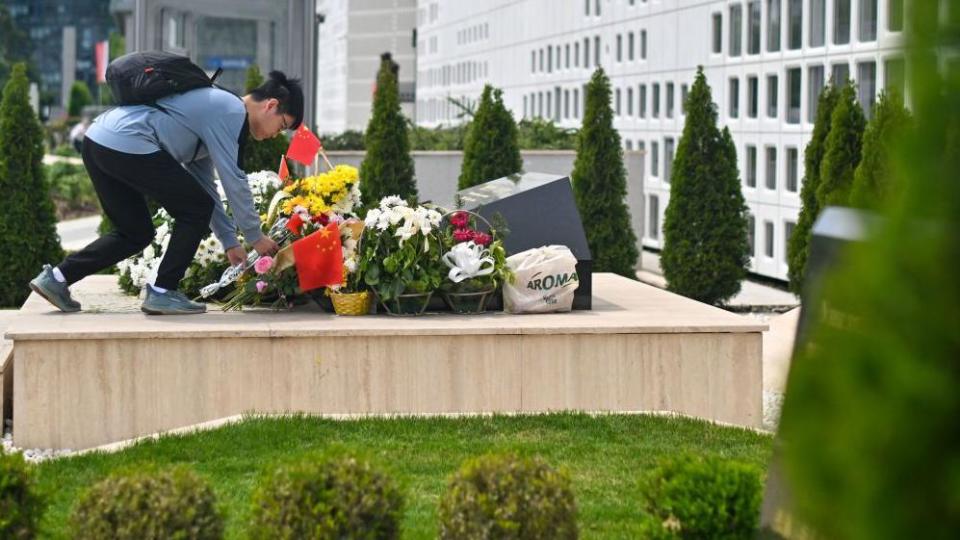The red flags start at Nikola Tesla Airport in Belgrade and run along the highway to the center of the Serbian capital.
With this, Serbia shows that it is proud of its “iron friendship” with China – and welcomes Xi Jinping to Belgrade.
At the Western City Gate, better known as the Genex Tower, an entire tower is covered in China’s national colors.
Just to be safe, there is a billboard for Hisense, the Chinese home appliance maker that opened a refrigerator factory in Valjevo, western Serbia, last year.
The Chinese president’s travel route may have caused a stir in some parts of Europe. After all, it’s not often that Serbia is part of a three-stop tour by an international leader of this stature.
But Serbia has deepened its ties with China in recent years, even as it continues negotiations to join the European Union.
Mr. Xi is likely to use his trip to voice his criticism of NATO. His visit coincides with the 25th anniversary of the US airstrikes on the Chinese embassy in Belgrade. And in an editorial for the Serbian newspaperpolitika, the president made it clear that feelings over the incident are still running high.
“We should never forget it,” he wrote. “The Chinese people value peace, but we will never allow such a tragic history to repeat itself.”
This type of rhetoric resonates in Serbia, where the vast majority of people oppose NATO membership. That’s a key factor in why this stop on Mr. Xi’s European tour makes perfect sense.

Commercial connections also play a role. The two countries signed a free trade agreement last year, building on a “comprehensive strategic partnership” in 2016 – the year of Mr. Xi’s previous visit to Serbia.
China now claims to be the largest source of foreign direct investment (FDI) in Serbia. Its ambassador Li Ming says Hisense, along with mining company Zijin and tire maker Linglong, is providing 20,000.
According to UN trade figures, China actually ranks fifth on the foreign direct investment list, behind Germany, Italy, the US and Russia.
Still, Chinese investment is eye-catching – and will likely only increase. Serbia has just received its first Chinese electric high-speed trains. They will eventually run alongside Swiss-made vehicles on the Belgrade-Budapest railway, which is being reconstructed with Chinese expertise and funding.
And that is just the beginning. Serbian Infrastructure Minister Goran Vesic said Chinese partners would work on other infrastructure, including roads, bridges, tunnels and sewage. “There is really a lot of room for cooperation with Chinese companies,” he told Serbian national broadcaster RTS.
No wonder Serbian President Aleksandar Vucic plans to personally serve his country’s best wines to his Chinese counterpart at a banquet honoring Mr. Xi himself.
Noting that Serbian wine will no longer be subject to import tariffs in China within five years, Mr. Vucic told China Central Television that Serbian wines are “not as expensive as…” [those] in France” and that he believed Mr. Xi would “like” his selection.
This was perhaps a gentle dig at Emmanuel Macron, who hosted Mr. Xi on the first stop of his European tour. The French president’s offer was a bottle of Rémy Martin Louis XIII cognac, which would cost a good 5,000 euros in Belgrade.
A trip to the Pyrenees was also part of the charm offensive – to sweeten Mr Macron and EU Commission President Ursula von der Leyen’s pleas to Mr Xi to ensure more balanced trade with Europe and persuade Russian President Vladimir Putin to to end the war in Ukraine.
After Belgrade, the Chinese President’s next stop is Budapest, where he will meet his strongest ally among the heads of state and government of the EU member states, Hungarian Prime Minister Viktor Orban.
Chinese investments are also a strong factor there – including a factory for electric car giant BYD, underpinning Mr Orban’s opposition to the EU consensus on everything from migration to arms supplies to Ukraine.
